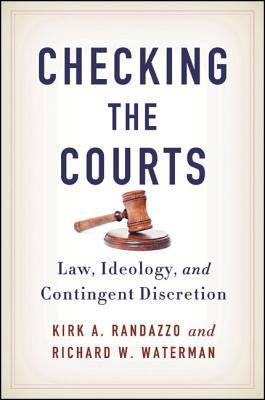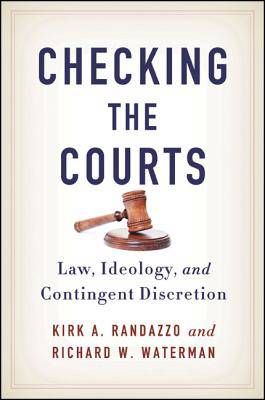
Door een staking bij bpost kan je online bestelling op dit moment iets langer onderweg zijn dan voorzien. Dringend iets nodig? Onze winkels ontvangen jou met open armen!
- Afhalen na 1 uur in een winkel met voorraad
- Gratis thuislevering in België vanaf € 30
- Ruim aanbod met 7 miljoen producten
Door een staking bij bpost kan je online bestelling op dit moment iets langer onderweg zijn dan voorzien. Dringend iets nodig? Onze winkels ontvangen jou met open armen!
- Afhalen na 1 uur in een winkel met voorraad
- Gratis thuislevering in België vanaf € 30
- Ruim aanbod met 7 miljoen producten
Zoeken
€ 145,45
+ 290 punten
Uitvoering
Omschrijving
How does the language of legislative statutes affect judicial behavior? Scholars of the judiciary have rarely studied this question despite statutes being, theoretically, the primary opportunity for legislatures to ensure that those individuals who interpret the law will follow their preferences. In Checking the Courts, Kirk A. Randazzo and Richard W. Waterman offer a model that integrates ideological and legal factors through an empirical measure of statutory discretion. The model is tested across multiple judicial institutions, at both the federal and state levels, and reveals that judges are influenced by the levels of discretion afforded in the legislative statutes. In those cases where lawmakers have clear policy preferences, legislation encourages judges to strictly interpret the plain meaning of the law. Conversely, if policy preferences are unclear, legislation leaves open the possibility that judges will make decisions based on their own ideological policy preferences. Checking the Courts thus provides us with a better understanding of the dynamic interplay between law and ideology.
Specificaties
Betrokkenen
- Auteur(s):
- Uitgeverij:
Inhoud
- Aantal bladzijden:
- 203
- Taal:
- Engels
- Reeks:
Eigenschappen
- Productcode (EAN):
- 9781438452876
- Verschijningsdatum:
- 1/09/2014
- Uitvoering:
- Hardcover
- Formaat:
- Genaaid
- Afmetingen:
- 160 mm x 239 mm
- Gewicht:
- 485 g

Alleen bij Standaard Boekhandel
+ 290 punten op je klantenkaart van Standaard Boekhandel
Beoordelingen
We publiceren alleen reviews die voldoen aan de voorwaarden voor reviews. Bekijk onze voorwaarden voor reviews.











